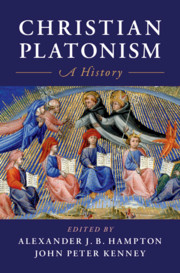Book contents
- Christian Platonism
- Christian Platonism
- Copyright page
- Dedication
- Contents
- Figures
- Contributors
- Acknowledgements
- I Concepts
- II History
- 2.1 The Bible and Early Christian Platonism
- 2.2 Platonism and Christianity in Late Antiquity
- 2.3 Christian Platonism in the Medieval West
- 2.4 Christian Platonism in Byzantium
- 2.5 Renaissance Christian Platonism and Ficino
- 2.6 Northern Renaissance Platonism from Nicholas of Cusa to Jacob Böhme
- 2.7 Christian Platonism in Early Modernity
- 2.8 Christian Platonism in the Age of Romanticism
- 2.9 Christian Platonism and Modernity
- III Engagements
- Index
- References
2.8 - Christian Platonism in the Age of Romanticism
from II - History
Published online by Cambridge University Press: 20 January 2021
- Christian Platonism
- Christian Platonism
- Copyright page
- Dedication
- Contents
- Figures
- Contributors
- Acknowledgements
- I Concepts
- II History
- 2.1 The Bible and Early Christian Platonism
- 2.2 Platonism and Christianity in Late Antiquity
- 2.3 Christian Platonism in the Medieval West
- 2.4 Christian Platonism in Byzantium
- 2.5 Renaissance Christian Platonism and Ficino
- 2.6 Northern Renaissance Platonism from Nicholas of Cusa to Jacob Böhme
- 2.7 Christian Platonism in Early Modernity
- 2.8 Christian Platonism in the Age of Romanticism
- 2.9 Christian Platonism and Modernity
- III Engagements
- Index
- References
Summary
This chapter explores the protean character of Christian Platonism in the Romantic Age. If the Enlightenment was frequently shaped by a critique of dogma, tradition and superstition, the Romantics were concerned with the loss of culture, the exaltation of abstract reason, and a longing for the transcendent. Platonism offered a means for revitalizing Christianity, caught between the cultured despisers of religion in the Enlightenment, and the annexation of creation to the mechanistic thought of the emergent natural sciences.
- Type
- Chapter
- Information
- Christian PlatonismA History, pp. 303 - 321Publisher: Cambridge University PressPrint publication year: 2020



